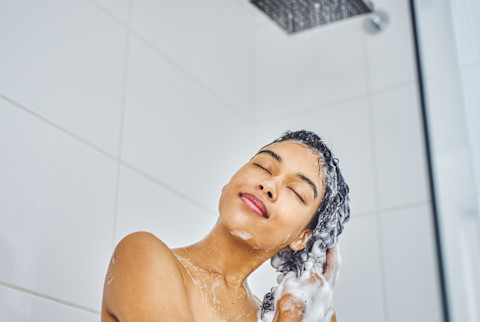How Common Hair Care Ingredients Can Lead To Increased Shedding

For the last several years, the beauty industry has gotten pretty good at driving home the message that scalp care is skin care: The area is an extension of the skin on your face and should be treated with quality ingredients and treatments.
Well, one derm takes it a step further and says that hair care is also skin care. Meaning, yes, even the products that are used only to treat the hair fibers can also influence the way your skin behaves.
"I believe hair care is skin care: Hair products can get on the skin and clog the pores, irritate and dry the skin, or cause eczema and other skin diseases. And in some cases these scalp concerns can even lead to hair shedding," says Harvard-trained board-certified dermatologist Iris Rubin, M.D., who specializes in scalp health; she's the founder of SEEN Hair Care, a beauty brand designed to be nonirritating for the scalp and skin.
On this episode of the Clean Beauty School podcast, I chat with Rubin about scalp issues like dandruff, hair loss, and what to look for in your hair care products.
What you need to know about allergens in your hair care
In the skin care space, it's very trendy for products and collections to be labeled "sensitive skin safe," "made for sensitive skin," "hypoallergenic," or "allergen-free." It seems that most new skin care launches now are formulated as appropriate for sensitive skin. It's not unheard of, but is certainly less common, for products to be labeled as such for hair care.
But as Rubin notes in the episode, lots of folks could benefit from finding sensitive-safe hair care formulas. "Everything you put on your hair gets on your skin. When you use shampoo or conditioner, even if you're careful to only apply it to the hair, it's gonna rinse down your scalp, your face, your chest, your back. And it turns out that many people actually have a thin film of hair care residue on our skin, even after they rinse," she says. "And residue isn't always a bad thing. Face lotions are residue. But you just need to make sure that whatever is in that residue is friendly to the skin." And this is especially true for those who are prone to acne, eczema, dryness, and other irritations.
In fact, those who are experiencing increased shedding may also consider finding a more gentle hair care collection. "If your hair care products have ingredients that are irritating to the skin, that can affect the hair follicle, which are the manufacturing plants of the hair," she says. "So allergens, for example, can irritate the scalp and follicle, which may lead to shedding in some cases."
Of course, hair loss and shedding are extremely complex issues, with several potential triggers and a myriad of influencing factors. So simply changing one element of your routine may not be the magic missing step, but it can help. In fact, Rubin notes that a recent six-month, randomized controlled trial they did with Harvard's Hair Loss Clinic found that those who switched to their Fragrance Free Shampoo and Conditioner (which is free of common allergens) for the duration of the study experienced 40% less shedding.
Throughout the episode, we also discuss how to ease dandruff, how often you should really shampoo your hair, and what to do about hairline and body acne.
